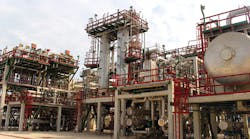Europe's petrochemical producers claim that a free trade agreement (FTA) between the European Community and the Gulf Cooperation Council is a threat to their industry in the medium and long term.
The Association of Petrochemical Producers in Europe (APPE), with headquarters in Brussels, said the proposed FTA would make Europe the most attractive target for production from the Persian Gulf states and lead to a distortion of worldwide competition.
Opening Europe to preferential access would lead to further investment in the GCC countries specifically targeted at Europe, APPE said. Ethylene capacity in the gulf area is expected to increase to 3.6 million tons/year by 1993 from 2 million tons/year at present.
DISPLACED EXPORTS
About 40% of GCC production currently goes to Southeast Asia, where a planned capacity increase of about 4 million metric tons/year will back out imports.
APPE said unless there are similar FTAs between the GCC and Japan and the U.S., this displaced production will be forced preferentially to Europe. Large scale petrochemical imports in Europe could cause a drastic restructuring with loss of perhaps tens of thousands of jobs and closure of several integrated operations with repercussions on downstream chemicals, it said.
The effect also would be felt in the European Free Trade Area countries that export to the EC, APPE said.
APPE said Europe already is the largest importer of chemicals among the three major world trading blocs. The EC imports $30 billion/year worth of products vs. $20 billion/year in the U.S. and $15 billion/year in Japan.
GCC ADVANTAGES
APPE said GCC countries do not need an added duty free entry advantage into Europe because they have access to low cost gas feedstock at 50 cents/MMBTU compared with $2.50/MMBTU on an equivalent basis in Europe.
And it added that as GCC countries move to liquid feeds to manufacture a wider range of products, it is important that the feedstock be charged at market prices and not locally subsidized.
European petrochemical producers are not opposed to free trade, APPE said, but feel the General Agreement on Trade and Tariffs is the most appropriate framework to guarantee a fair sharing of the burden among contracting parties.
GATT also would have the merit of leading the GCC countries to become part of this structure and respect its discipline, APPE said.
APPE also questions the lack of reciprocity in the EC mandate. It said there is no mention of investment, joint ventures, and access to feedstocks in the GCC countries.
Copyright 1990 Oil & Gas Journal. All Rights Reserved.
